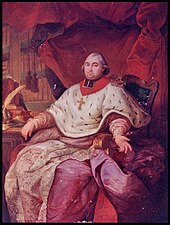Franciscus-Antonius de Méan
François-Antoine de Méan de Beaurieux (born July 6, 1756 in Saive near Blegny , Belgium, † January 15, 1831 in Mechelen) was the last Prince-Bishop of Liège and Archbishop of Mechelen . He was nicknamed "Franziskus Antonius von Mechelen".
Life
François-Antoine de Méan was born in Saive Castle as the son of Count François Antoine de Méan de Beaurieux and Countess Maria Elisabeth Hoensbroeck. His grandfather was the mayor of Liège and his younger brother Cesar Konstantin de Méan later became prime minister when Franciscus-Antonius took over the reign of the Principality of Liège .
Prince Franciscus-Antonius de Méan studied in Mainz and Douai and was ordained a priest for the diocese of Liège on September 17, 1785 . On December 19, 1785 he was appointed titular bishop of Hippos and auxiliary bishop in Liège. The episcopal ordination received his uncle Caesar Constantine Francis of Hoensbroech , Prince Bishop of Liege, on 19 February of the following year.
During the Liège Revolution of 1789 he fled to Trier with his uncle Caesar Constantin Franz von Hoensbroech and returned to Liège in 1791. After the death of his uncle he became Prince-Bishop of Liège on August 16, 1792, he won the following titles: Duke of Bouillon , Marquis of Franchi Ment, Count of Looz and Hornes and Baron of Herstal . On September 24, 1792, he received papal confirmation of his appointment and also the title of Prince of the Holy Roman Empire of the German Nation .
His reign was interrupted between 1792 and 1801 by the occupation of French troops. With the Concordat of July 15, 1801, the existence of the Principality of Liège ended. Liège was subordinated to the reorganized Archdiocese of Mechelen as a suffragan . De Méan de Beaurieux was the last Prince-Bishop of Liège and was appointed Archbishop of Mechelen on July 28, 1817.
William I , King of the United Kingdom of the Netherlands , had appointed Prince-Bishop de Méan as a member of the Senate, and so after 1817 the Archbishop was the highest representative of the Roman Catholic Church in the kingdom who took the oath on the constitution . The Holy See reprimanded the behavior and de Méan traveled to Rome in 1817, finally the Vatican confirmed de Méan as Archbishop of Mechelen. The decision of Wilhelm I to close the diocesan priestly formation, and thus the seminaries , led to a church dispute. The king had established the "Collegium Philosophicum" in Leuven and since 1825 tried to supervise the training of priests in the Roman Catholic Church. Only after his death did his successor, Cardinal Engelbert Sterckx , succeed in returning the training of priests to the hands of the bishops after the founding of the Kingdom of Belgium.
Web links
| predecessor | Office | successor |
|---|---|---|
| Dominique Dufour de Pradt |
Archbishop of Mechelen 1817–1831 |
Engelbert Cardinal Sterckx |
| Caesar Constantin Franz von Hoensbroech |
Prince-Bishop of Liège 1792 (-1801) |
Jean-Évangéliste Zaepffel |
| personal data | |
|---|---|
| SURNAME | Méan, Franciscus-Antonius de |
| ALTERNATIVE NAMES | Méan de Beaurieux, François-Antoine de (French name) |
| BRIEF DESCRIPTION | Prince-Bishop of Liège and Archbishop of Mechelen |
| DATE OF BIRTH | July 6, 1756 |
| PLACE OF BIRTH | Saive near Blegny |
| DATE OF DEATH | January 15, 1831 |
| Place of death | Mechelen , Belgium |

